The immune system plays a key role in protecting the body against harmful pathogens, infections, and diseases. However, for it to work effectively, it needs to be properly regulated.
This is where peptides for immune system regulation come into play. Peptides are short chains of amino acids that have shown significant promise in boosting immune responses, reducing inflammation, and promoting tissue repair.
Peptides interact with immune cells and help the body respond to infections and injuries. While peptides are primarily used for research purposes and are not approved for human use outside clinical settings, their effects on immune modulation are widely studied.
The peptides discussed in this article are some of the most researched and promising candidates for immune system health, based on current research.
Peptides for immune system regulation work by interacting with key immune cells, such as T-cells, B-cells, and macrophages. These interactions either help increase immune responses or reduce excessive immune activity. This keeps the immune system working well and prevents it from attacking the body’s own tissues.
Some peptides for immune system regulation help immune cells fight infections. Other peptides control inflammation to prevent chronic diseases like autoimmune disorders. Peptides that regulate inflammation are crucial in maintaining a balanced and effective immune system. Their ability to manage immune activity is vital for maintaining a healthy immune response.
As we discuss the best peptides for immune system regulation, let’s explore how each one targets key immune cells and functions in the body.
Explore Peptide Supplies at Direct Peptides Europe for all your reconstitution requirements.
The following seven peptides for immune system regulation are among the best for improving immune function, reducing inflammation, and aiding tissue repair. These peptides are well-researched and considered essential for immune system regulation:
Thymosin Alpha-1 (Tα1)
TB500 (Thymosin Beta-4)
LL-37
BPC-157 (Body Protective Compound-157)
VIP (Vasoactive Intestinal Peptide)
Thymalin
Epithalon
Each of these peptides interacts with immune cells in different ways to help immune health. Let’s begin by examining Thymosin Alpha-1 and how it helps activate T-cells, which are essential in immune defense.
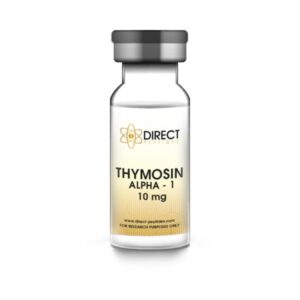 Thymosin Alpha-1 (Tα1) is one of the best peptides for immune system regulation, as it significantly boosts T-cell activation, a critical component of immune defense.
Thymosin Alpha-1 (Tα1) is one of the best peptides for immune system regulation, as it significantly boosts T-cell activation, a critical component of immune defense.
T-cells are responsible for recognizing and eliminating infected or abnormal cells. Tα1 helps create more helper T-cells, which activate other immune cells, such as B-cells (for antibody production) and macrophages (for pathogen engulfment).
By improving T-cell proliferation, Tα1 strengthens the immune system’s response to infections, particularly in people with weak immune systems.
It also activates dendritic cells, which play a key role in presenting pathogens to T-cells, ensuring the immune system effectively targets and fights infections.
While Tα1 boosts immune activation, TB500 works on a different aspect of immune function by ensuring immune cells reach areas of infection or injury where they’re most needed.
This localized response makes the immune reaction more effective and targeted, contributing significantly to peptides for immune system regulation.
Discover Thymosin Alpha-1 from Direct Peptides Europe, a peptide that enhances T-cell activation and strengthens immune responses to promote a balanced immune system.
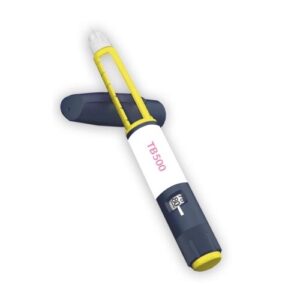 TB500 (Thymosin Beta-4) is known for helping tissue repair and speeding up healing. But it also plays a big role in immune cell migration. TB500 helps immune cells travel to areas where infections or injuries are, ensuring the immune response is both fast and focused.
TB500 (Thymosin Beta-4) is known for helping tissue repair and speeding up healing. But it also plays a big role in immune cell migration. TB500 helps immune cells travel to areas where infections or injuries are, ensuring the immune response is both fast and focused.
TB500 also helps tissue regeneration by lowering inflammation and encouraging cell regeneration. This makes it a valuable peptide for both immune system regulation and wound healing. By speeding up tissue repair, it helps the body recover faster from infections and injuries.
While Tα1 boosts immune cell activation, TB500 ensures those cells reach infection sites. Next, we look at LL-37, which fights infections directly while controlling inflammation.
Explore TB500 from Direct Peptides Europe, a peptide that supports immune cell migration and accelerates tissue repair, aiding in faster recovery.
LL-37 is a naturally occurring antimicrobial peptide that helps protect the body from a wide range of pathogens, like bacteria, viruses, and fungi.
It directly neutralizes these harmful invaders and prevents them from spreading. In addition to fighting infections, LL-37 also helps control inflammation.
LL-37 manages immune response by controlling macrophage-induced inflammation, ensuring the immune system doesn’t become too active. By regulating inflammation, LL-37 helps prevent autoimmune diseases and chronic inflammation.
While LL-37 fights infections, BPC-157 takes a different approach. It focuses on repairing damaged tissues, ensuring healing can begin without interference from lingering inflammation.
Learn about LL-37 from Direct Peptides Europe, an antimicrobial peptide that combats pathogens while controlling inflammation to maintain immune balance.
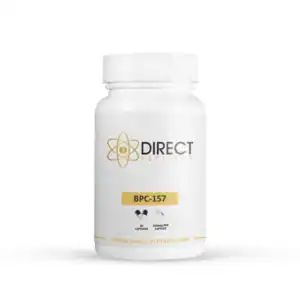 BPC-157 (Body Protective Compound-157) is a peptide known for its tissue-repairing and immune-regulating abilities. It speeds up cell regeneration and reduces inflammation, making it an essential peptide for immune function and healing.
BPC-157 (Body Protective Compound-157) is a peptide known for its tissue-repairing and immune-regulating abilities. It speeds up cell regeneration and reduces inflammation, making it an essential peptide for immune function and healing.
Research shows that BPC-157 helps repair tissue by boosting the regeneration of damaged tissues and improving immune cell activity during recovery.
In addition to boosting immune function, BPC-157 ensures that inflammation doesn’t slow down tissue repair. By aiding in healing and controlling immune responses, BPC-157 supports the body’s recovery from infections or injuries, making it a vital peptide for immune system regulation.
After examining BPC-157, we now look at VIP, a peptide that regulates immune cells and prevents excessive inflammation.
Discover the benefits of BPC-157 from Direct Peptides Europe, a peptide known for enhancing tissue repair, promoting cell regeneration, and reducing inflammation.
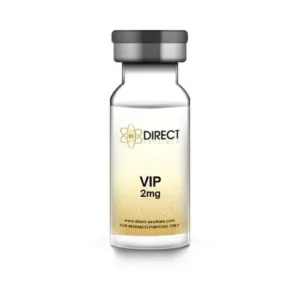 VIP (Vasoactive Intestinal Peptide) helps regulate immune cells, especially macrophages and T-cells. VIP has anti-inflammatory properties, helping to control immune responses and prevent excessive inflammation.
VIP (Vasoactive Intestinal Peptide) helps regulate immune cells, especially macrophages and T-cells. VIP has anti-inflammatory properties, helping to control immune responses and prevent excessive inflammation.
By managing immune cell activity, VIP ensures the immune system responds well to infections and injuries without harming the body’s tissues.
VIP plays a big role in keeping immune homeostasis, preventing chronic inflammation and immune overreaction. This makes it especially useful in managing autoimmune diseases and inflammatory disorders.
While VIP focuses on maintaining immune balance and controlling inflammation, Thymalin complements this function by enhancing immune cell activity, particularly the production of T-cells and macrophages, which are vital for immune defense.
Find out how VIP from Direct Peptides Europe regulates immune cells, controlling inflammation and maintaining immune system balance.
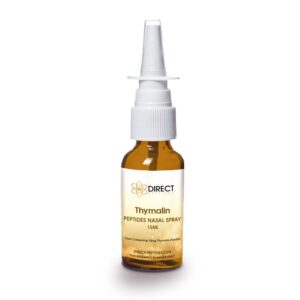 Thymalin is a peptide that has shown potential in modulating immune function by regulating the production and activity of T-cells and macrophages.
Thymalin is a peptide that has shown potential in modulating immune function by regulating the production and activity of T-cells and macrophages.
Known for its immune-enhancing properties, Thymalin helps improve immune responses, particularly in older adults or those with weakened immune systems.
Thymalin supports the immune system by improving its ability to respond to infections and promoting overall immune balance.
It plays a crucial role in immune modulation, making it an important peptide for maintaining a healthy and functional immune system.
While Thymalin enhances immune responses by boosting the activity of immune cells, Epithalon works to regenerate those immune cells and rejuvenate the immune system, especially in aging individuals where immune decline is a concern.
Learn about Thymalin from Direct Peptides Europe, a peptide that modulates immune function by enhancing T-cell and macrophage activity for improved immune responses.
 Epithalon is a peptide that has shown promise in regenerating immune cells and improving immune system function. It increases telomerase activity, which helps slow the aging of immune cells, potentially boosting immune function in older adults.
Epithalon is a peptide that has shown promise in regenerating immune cells and improving immune system function. It increases telomerase activity, which helps slow the aging of immune cells, potentially boosting immune function in older adults.
As the immune system weakens with age, Epithalon helps support immune health by increasing immune cell production and enhancing immune responses.
Though research on Epithalon is still early, it is believed that this peptide could provide important age-related immune support, especially in people who are more vulnerable to infections due to immune decline.
In addition to helping regenerate immune cells, the safety and long-term use of peptides like Epithalon should be carefully considered as research continues. Understanding how these peptides work alongside other treatments is key for their integration into healthcare.
Explore Epithalon from Direct Peptides Europe, a peptide that helps rejuvenate immune cells and supports immune health, especially in the context of age-related immune decline.
Although the potential benefits of peptides for immune system regulation are promising, it’s important to remember that these peptides are mainly for research purposes and are not yet approved for widespread human use. More studies are needed to understand their safety and effectiveness in the long run.
Like with any emerging treatment, clinical trials are needed to assess the safety of peptides in human use. Researchers are working hard to ensure these peptides are safe and assess their long-term potential. Until more data is available, caution is necessary.
Peptide research is still in its early stages, but the potential is huge. As scientists explore how peptides can be used for immune system regulation, we expect to see new breakthroughs in immune health.
One exciting possibility is combining peptides like Thymosin Alpha-1 and VIP to create therapies that target multiple aspects of immune function—boosting immune responses while reducing inflammation.
Peptides could be a game-changer in treating chronic infections, autoimmune diseases, and other immune-related conditions. By tailoring peptide combinations to individual needs, treatments could become more targeted and personalized. As research progresses, peptide-based therapies could significantly improve immune response and overall health.
The potential of peptides for immune system regulation is an exciting development in immunology. Peptides like Thymosin Alpha-1, TB500, LL-37, BPC-157, VIP, Thymalin, and Epithalon offer significant benefits in enhancing immune responses, reducing inflammation, and promoting tissue repair. As research continues, these peptides could play a central role in therapies for immune-related disorders.
While these peptides are still mainly used for research purposes and are not approved for human use, their potential to improve immune health is great. As science advances, peptides could become a key part of immune system therapies, helping the body maintain an effective and balanced immune response.
[1] Li J, Liu CH, Wang FS. Thymosin alpha 1: biological activities, applications and genetic engineering production. Peptides. 2010 Nov;31(11):2151-8.
[2] Sosne G, Qiu P, Kurpakus-Wheater M. Thymosin beta 4: A novel corneal wound healing and anti-inflammatory agent. Clin Ophthalmol. 2007 Sep;1(3):201-7.
[3] Yang B, Good D, Mosaiab T, Liu W, Ni G, Kaur J, Liu X, Jessop C, Yang L, Fadhil R, Yi Z, Wei MQ. Significance of LL-37 on Immunomodulation and Disease Outcome. Biomed Res Int. 2020 May 16;2020:8349712.
[4] Huang T, Zhang K, Sun L, Xue X, Zhang C, Shu Z, Mu N, Gu J, Zhang W, Wang Y, Zhang Y, Zhang W. Body protective compound-157 enhances alkali-burn wound healing in vivo and promotes proliferation, migration, and angiogenesis in vitro. Drug Des Devel Ther. 2015 Apr 30;9:2485-99.
[5] Smalley SG, Barrow PA, Foster N. Immunomodulation of innate immune responses by vasoactive intestinal peptide (VIP): its therapeutic potential in inflammatory disease. Clin Exp Immunol. 2009 Aug;157(2):225-34.
[6] Yan F, Mo X, Liu J, Ye S, Zeng X, Chen D. Thymic function in the regulation of T cells, and molecular mechanisms underlying the modulation of cytokines and stress signaling (Review). Mol Med Rep. 2017 Nov;16(5):7175-7184.
[7] Khavinson V, Diomede F, Mironova E, Linkova N, Trofimova S, Trubiani O, Caputi S, Sinjari B. AEDG Peptide (Epitalon) Stimulates Gene Expression and Protein Synthesis during Neurogenesis: Possible Epigenetic Mechanism. Molecules. 2020 Jan 30;25(3):609.
Shop ALL Peptide Vials from Direct Peptides Europe today, your trusted supplier of premium clinical grade peptides online.
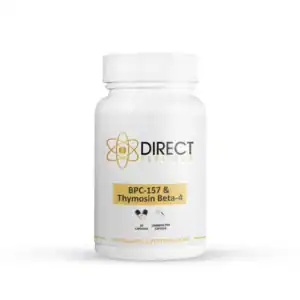
BPC-157 Thymosin Beta-4 Capsules
£148.73 Select options This product has multiple variants. The options may be chosen on the product page
Epithalon Pre-Mixed Pen 100mg
£96.33 – £260.09Price range: £96.33 through £260.09 Select options This product has multiple variants. The options may be chosen on the product page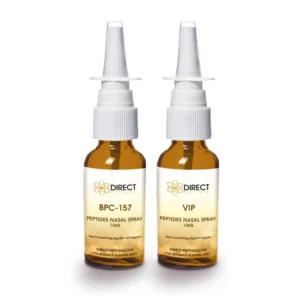
BPC-157 VIP Nasal Stack
£41.13 – £73.26Price range: £41.13 through £73.26 Select options This product has multiple variants. The options may be chosen on the product page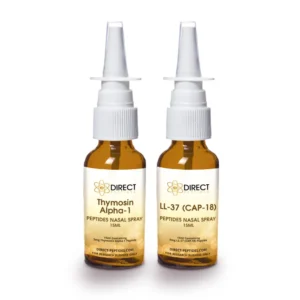
Thymosin Alpha-1 LL-37 Nasal Stack
£99.08 – £189.16Price range: £99.08 through £189.16 Select options This product has multiple variants. The options may be chosen on the product pageALL CONTENT AND PRODUCT INFORMATION AVAILABLE ON THIS WEBSITE IS FOR EDUCATIONAL PURPOSES ONLY.
DISCLAIMER: These products are intended solely as a research chemical only. This classification allows for their use only for research development and laboratory studies. The information available on our Europe Direct Peptides website: https://direct-peptides.com is provided for educational purposes only. These products are not for human or animal use or consumption in any manner. Handling of these products should be limited to suitably qualified professionals. They are not to be classified as a drug, food, cosmetic, or medicinal product and must not be mislabelled or used as such.